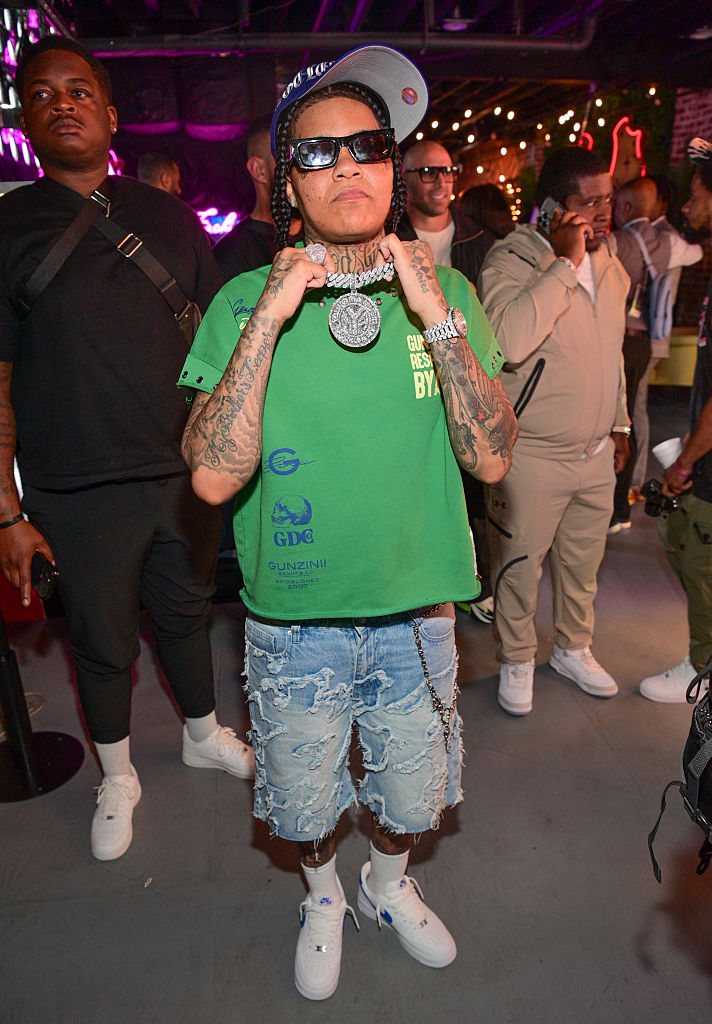Music
Page: 65
Trending on Billboard
Long live CMAT summer. The Irish pop star has been revealed as the latest headliner for the 2026 edition of London’s Lido Festival, performing on June 12.
The booking marks the Irish pop star’s first-ever U.K. festival headline slot. It follows a stellar year that has seen her cross over into the mainstream and deliver much talked-about performances at high-profile events including Glastonbury, All Points East and Green Man.
Explore
See latest videos, charts and news
She will be joined by a stacked bill of artists on the day, with supports including Father John Misty and Sharon Van Etten & The Attachment Theory. The other names confirmed to appear so far are: Beverly Glenn-Copeland and Elizabeth Copeland, Getdown Services, Katy J Pearson, Junior Brother, Jacqui McShee’s Pentangle and Zakia (DJ).
Tickets for the event, which will take place in Victoria Park, go on sale on Thursday (Nov. 13) at 10 a.m. (BST). More information can be found at the festival’s official website.
In August, CMAT (born Ciara Mary-Alice Thompson) unveiled her third studio album EURO-COUNTRY via AWAL. Upon release, the record hit No. 2 on the Official U.K. Albums Chart, her highest placing on the chart to date.
The continued success of EURO-COUNTRY has also seen the songwriter land a Mercury Prize 2025 nomination, as well embark on sold-out tours across the U.K. and the U.S. The LP follows 2023’s Crazymad For Me and her debut album If My Wife New I’d Be Dead, released the year prior.
The inaugural Lido festival took place this year, welcoming 35,000 fans a night with Charli xcx, Jamie xx, Massive Attack and London Grammar all topping the bill across two weeks of shows.
Named after Victoria Park’s Lido Field, the event has a strong focus on sustainability and holds community events during the week. Its second iteration will also include electronic duo Maribou State, who are headlining the festival on June 20.

Trending on Billboard SZA‘s Not Charity has teamed up with the Los Angeles-based restaurant Jon & Vinny’s to provide 1,400 free meals for people who are struggling to put food on the table in the midst of the longest government shutdown in history as their SNAP (Supplemental Nutrition Assistance Program) benefits dry up. Explore See […]

Trending on Billboard
Femme It Forward will be hosting its fourth annual Give Her FlowHERS Gala this month, Billboard can exclusively announce on Tuesday (Nov. 11).
Ciara will be honored with the Muse Award, which pays homage to a living legend whose legacy, impact and timeless music inspires past, current and future generations. Kehlani will receive the Alchemist Award, honoring a woman who turns her struggles into strength and her truth into timeless art. She is also being honored at ASCAP Women Behind the Music on Wednesday, Nov. 12. They also received two Grammy nominations when the full slate was announced last Friday (Nov. 7) for best R&B song and best R&B performance with “Folded,” Kehlani’s first Billboard Hot 100 top 10 hit. Jhené Aiko will receive the Glow Getter Award, which honors women who embody wellness, self-care and purpose. Last year, Aiko launched her holistic self-care brand Jhenetics, which includes elixirs, body balms, lotions and bath soaks that aim to “nourish the spirit and cultivate balance from the inside out,” according to its website.
Mariah the Scientist will be honored with the Bloom Award, spotlighting a breakthrough artist whose growth and grace have transformed her journey into full bloom. Mariah’s “Burning Blue” lead single from her fourth studio album Hearts Sold Separately became her highest-charting hit on the Hot 100 (No. 25) this year, while Hearts Sold Separately became her highest-charting album on the Billboard 200 (No. 11). Normani will receive the Femme It Forward Award, which honors women who have made incredible inroads within their industries and communities through impactful service and leadership. Nikki Taylor, Teyana Taylor‘s mother, will be honored with the Queens Raising Queens Award, awarded to mothers and maternal figures whose love, guidance and example empower the next generation of women to rise, thrive and lead. Teyana — who received her first Grammy nomination for best R&B album with Escape Room — accepted the Visionary Award in 2023.
Gail Mitchell, Billboard executive director of R&B and hip-hop, will be honored with the Mentor Excellence Award, which recognizes leaders who open doors and pour into the next generation through mentorship at the highest level. Sylvia Rhone, former chairwoman/CEO of Epic Records, will receive the Legacy Award, which honors visionary leaders whose groundbreaking contributions have not only shaped the entertainment industry, but built the very foundation on which future generations now stand. Rhone was the first Black industry executive and woman to chair a major record company. She was Billboard‘s Women in Music executive of the year in 2023.
“Every year, Give Her FlowHERS reminds me why this work matters. It’s about celebrating the women who show up, do the work and keep moving our culture and industry forward,” says Heather Lowery, CEO/founder of Femme It Forward, in an exclusive statement. “For me, it’s not just about honoring them, it’s about creating a space where women feel seen, supported and inspired to take up space unapologetically. This year’s honorees truly embody what it means to lead with purpose, create from the heart and pour into others while they rise.”
The 2025 Give Her FlowHERS Gala will return to the Beverly Hilton on Friday, Nov. 21. This year’s theme, “Same Root. New Flower,” celebrates the beauty of evolution, the shared roots that connect us all as woman and endless ways we continue to bloom. The gala serves as a fundraiser for Next Gem Femme, Femme It Forward’s mentorship program that’s designed to improve equity and accelerate career opportunities for women in music and entertainment. The mentorship program and gala reflect Femme It Forward’s deep commitment to cultivating a thriving ecosystem of women supporting women, rooted in community, creativity and purpose.
Trending on Billboard Metallica surprised Melbourne fans on Saturday night (Nov. 8) by covering Aussie punk rock legends The Living End during their M72 World Tour stop at the city’s Belluna Arena — and frontman Chris Cheney has officially responded, with a delightfully cheeky tale from his high school days. Explore See latest videos, charts […]
Trending on Billboard
A wave of international Bluesfest 2026 artists have confirmed headline dates across Australia for March and April next year, in addition to their festival sets at Byron Bay’s Tyagarah Tea Tree Farm.
Explore
See latest videos, charts and news
Among them are The Black Crowes, Sublime, Buddy Guy, The Pogues, Marcus King Band, Kenny Wayne Shepherd Band, and Talking Heads’ Jerry Harrison and King Crimson’s Adrian Belew, who will perform their Remain In Light show with special guest Robert Randolph.
The announcement arrives days after Bluesfest confirmed its first artist lineup for 2026. While Split Enz and Counting Crows have already rolled out separate tour itineraries, the new additions round out a larger national offering, giving fans beyond Byron Bay a chance to catch exclusive one-night-only shows in capital cities and select regional centres.
Sublime will appear at Melbourne’s Festival Hall on April 1, followed by Bluesfest on April 2 and a final stop at Sydney’s Hordern Pavilion on April 4. The Black Crowes will tour extensively, performing at The Forum in Melbourne, Fortitude Music Hall in Brisbane, Newcastle Entertainment Centre, and Sydney’s Enmore Theatre, either side of their Byron Bay date.
Buddy Guy, who turns 90 in July 2026, will play the Sydney Opera House and Melbourne’s Palais Theatre. His appearances at Bluesfest mark what could be his final Australian performances. The Pogues, commemorating the 40th anniversary of their 1985 album Rum, Sodomy & the Lash, will headline shows in Fremantle, Adelaide, Melbourne and Sydney, with multiple performances also scheduled at the festival.
Additional sideshows include Marcus King Band touring Sydney, Melbourne and Adelaide; Kenny Wayne Shepherd Band marking 30 years of Ledbetter Heights; and Jerry Harrison & Adrian Belew performing their Remain in Light collaboration in Melbourne, Sydney and Brisbane.
Presale access opens Tuesday, Nov. 11 at 11 a.m. AEDT via the Bluesfest Touring website, with general public tickets available from Thursday, Nov. 13. Tickets and full information are available via bluesfesttouring.com.au.
The Bluesfest sideshow rollout underscores the event’s growing national footprint as it continues to rebound from the pandemic era. Bluesfest 2025 welcomed more than 109,000 attendees — its biggest turnout since 2019 — and was described by festival director Peter Noble as “the third-biggest event we’ve done in the history of the festival.”
“We’ve worked hard to get here,” Noble said in April. “We’ve had the highest attendance of any Australian festival since pre-COVID… Festivals are back.”
Trending on Billboard
Peach PRC is set to headline her biggest shows yet, announcing a string of arena and theatre dates across Australia and New Zealand for March 2026.
The Australian pop star will launch her Wandering Spirit tour in Melbourne on March 12 at the Palace Foreshore, followed by stops in Adelaide, Sydney, Brisbane and Perth. She’ll then make her New Zealand headlining debut with performances at Shed 6 in Wellington on March 28 and Powerstation in Auckland on March 29.
The tour follows a blockbuster two years for Peach, who released her debut EP Manic Dream Pixie in 2023. That project debuted at No. 1 on the ARIA Albums Chart and featured the breakout single “Perfect for You,” which went on to win Best Single at the 2024 Rolling Stone Australia Awards.
Explore
See latest videos, charts and news
Earlier this month, Peach returned with her latest single “Miss Erotica” — a provocative, high-fantasy ode to strip clubs and the showgirls who shaped her early adulthood. Co-written in Los Angeles with Ryan Linvill and Maya Kurchner (Olivia Rodrigo, Chappell Roan), the track marks a bold creative turn for the singer, ushering in what she has described as her most empowered era to date.
Across her catalogue, Peach PRC has racked up over 230 million global streams, alongside more than 2 billion social views and 27 million video views. Her early hits — including “Josh,” “God Is a Freak” and “Forever Drunk” — earned her a loyal online following, but her live presence has grown in tandem. The 2026 tour marks her most extensive run to date, following support slots for Yungblud and previous sold-out headline dates in Sydney and Melbourne.
Joining her on all Australian dates are New York pop singer Maude Latour — who released her debut album Sugar Water in 2024 and has appeared at major festivals including Lollapalooza and Governors Ball — and rising Sydney artist Salty, whose viral 2024 single “See U in 3” kicked off a new era of theatrical, emotionally rich pop.
Frontier Touring will host a members-only presale beginning 1 p.m. local time on Thursday, Nov. 13. General sale begins Friday, Nov. 14 at 3 p.m. local time.
Trending on Billboard Mark Hoppus is heading to Australia in 2026 — but this time, he’s not coming with Blink-182 or a bass guitar in hand. Instead, the beloved frontman will take fans behind the scenes of his life and career for An Evening of Storytelling with Mark Hoppus, a spoken-word live tour that promises […]
Trending on Billboard The Eagles have added more 2026 dates to their Sphere residency, extending their run as the artist with the most dates at the Las Vegas immersive venue to 56. The new shows will take place March 20-21 and March 27-28. The Rock & Roll Hall of Fame inductees had previously announced […]
A little before the likes of Cardi B and Ice Spice became the biggest female rappers to come out of New York, it seemed like Young M.A was destined to be crowned the next Queen of NY (alongside Nicki Minaj of course), but has since dealt with personal issues that derailed her career and made way for the aforementioned artists to shine bright under the city lights.
Now that she’s back to her old self, Young M.A is attempting to make a comeback for the ages, and we’re riding with her till the wheels fall off.
Dropping off some new visuals to “Thumpers,” the Brooklyn rapper hits the block with her street team while dripping in ice and shooting some dice to make a little pocket change while collecting some rap royalties. It’s great to see her back on her healthy sh*t.
Keeping the scene in BK, Fivio Foreign is looking to reclaim the top spot of his own, and for his clip to “Hungry For It,” Fivio goes out for a night in the town with his own peep,s where they enjoy some thick talent at the strip club before laying down the track in a makeshift studio in someone’s lab.
Check out the rest of today’s drops and some joints you might’ve missed over the weekend, including work from Skrilla featuring Shawny Binladen, Peezy, and Rick Ross, and more.
YOUNG M.A – “THUMPERS”
FIVIO FOREIGN – “HUNGRY FOR IT”
SKRILLA FT. SHAWNY BINLADEN – “#’S ON THAT BOARD”
PEEZY & RICK ROSS – “HIDE THE REST”
NINO MAN – “GET MONEY”
ELLA MAI – “LITTLE THINGS”
BIG BOOGIE – “BACK DA F**K UP”
JASONMARTIN AND MIKE & KEYS – “I CAN’T TELL”
—
Photo: Getty

Trending on Billboard “Amazing!” That was just one of the many accolades being shouted out by fans exiting the Kia Forum on Sunday night after Brandy and Monica wrapped a two-night stopover in Inglewood, California, on their co-headlining The Boy Is Mine Tour. Since launching the highly anticipated 32-date tour in Cincinnati (Oct. 16), Brandy […]

 State Champ Radio
State Champ Radio 





